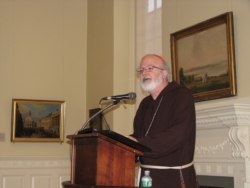Cardinal speaks on ‘power of the Eucharist’ at lunchtime lecture series
BOSTON -- Attending Mass without knowing how to pray, may indeed be tedious, said Cardinal Seán P. O’Malley to a standing-room only crowd at the Old Statehouse in downtown Boston May 24.
“If Mass is a chore, a burden, a boring exercise, the problem is perhaps that we have forgotten how to pray. We have first to close the chamber door and pray to our Father in secret,” he said. “I always say that if you go to church and you don’t know how to pray, you’ll find it very boring. If we live our lives and we don’t learn how to love, we will find life very boring.”
Cardinal O’Malley spoke at the last lecture in an eight-part series, Christ Speaks in the City, organized by the archdiocesan Office of Vocations. The lunchtime series was an effort to attract young professionals to hear how Christ speaks in today’s hectic and busy world.
“The program itself for the last year has been a great success,” said Father Daniel Hennessey, director of Vocations. “It helps us to see that in the midst of all of life’s activities, we can see Christ’s presence if we invite Him in.”
That was especially visible in downtown Boston during the activity of the workday lunch hour. After receiving much positive feedback from the series, the Vocations Office plans to organize another series that will begin next September, he said.
During the final lecture, Cardinal O’Malley spoke to Catholics from every age group about “The Power of the Eucharist.” The diverse crowd of 85 people filled the room to the fire code limit.
Cardinal O’Malley said that we live in a world where people are addicted to entertainment. Catholics come to Mass seeking a concert or a “barn-burning sermon,” instead of Jesus Christ in the Eucharist.
Others do not attend Mass at all. Catholic parents drop their children off at religious education classes like they do at soccer practice and do not bring their children to Mass, he said.
The crisis in modern society is directly related to the secularization of society. So many people have forgotten about God, he said.
“The world is being run by people with spiritual amnesia,” he said.
Only by reaching out to God through prayer can people understand the mystery of the Mass. Through the Eucharist, Jesus fulfills His promise to be with His people to the end of time. Driven by His intense love for humanity, He died on the cross and gives His body away daily in the form of bread and wine, he said.
“The Eucharist is God’s invention. It manifests the ingenuity of a wisdom that at the same time is the foolishness of love,” Cardinal O’Malley said.
Where we see only bread and wine, we have faith in the presence of God who offers Himself as food and drink to His creatures, he said.
“Everything in the Eucharist derives from love carried to the extreme. All emerges from a limitless will to give,” he said. “God’s love is so inventive that He has devised a way to be close to us and to allow us to be united with Him and with our fellow disciples who share the same loaf and the same cup.”
We seek God in the grandiose and spectacular, but He comes to us in humility and simplicity. The Eucharist is a great treasure that Jesus instituted at the Last Supper, he added.
The Catholic Church sprang up around the breaking of bread, Cardinal O’Malley continued.
“The first generations of Christians were celebrating the Lord’s Supper even before the New Testament was written down. In other words, the Mass is older than the books of the New Testament,” he said. “When it came time for the Church to determine which Scriptures were inspired and should be included in the canon of the Bible, one of the criteria was to choose the readings that were being read at the celebration of the Eucharist.”
The Lord challenges us to believe in the Eucharist. Jesus clearly states in John, chapter 6, “I am the bread come down from heaven. Whoever eats this bread will live forever and the bread I will give is my flesh for the life of the world,” he said.
Many in the Gospel were turned off by Christ’s assertions and walked away, he added.
The cardinal said, “Jesus doesn’t call them back and apologize. He doesn’t say He’s using metaphors or figures of speech. Rather, He asks those who stayed behind with their mouths open in shock, His apostles, ‘Are you going to leave me too?’”
Peter replies in the name of the faithful, “Lord, to whom shall we go? You have the words of eternal life.”
Cardinal O’Malley urged those present to love the Eucharist, God’s presence in our midst. He also encouraged Catholics to give of themselves as Jesus does through the Eucharist. Only through self-giving love can we find fulfillment, he said.
“The only way our life will find meaning and fulfillment is if we make a gift of our lives to God and to others. That is our mission,” he said.



















